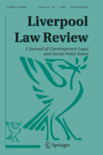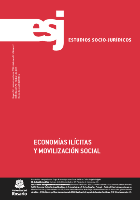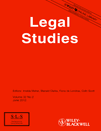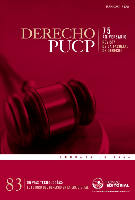
Access to Justice in Eastern Europe
Scope & Guideline
Navigating Justice: Insights from Eastern Europe.
Introduction
Aims and Scopes
- Legal Analysis and Comparative Studies:
The journal publishes articles that explore legal frameworks, comparing different jurisdictions and their approaches to justice, human rights, and legal reforms. - Human Rights and Access to Justice:
A significant focus is placed on the intersection of human rights and legal access, examining how laws and policies impact marginalized communities in Eastern Europe. - Impact of Geopolitical Events on Legal Systems:
The journal addresses the influence of geopolitical tensions, such as the Russia-Ukraine conflict, on legal practices and justice delivery in the region. - Innovations in Legal Practices:
There is a consistent interest in exploring innovative legal practices, including the use of technology in law, mediation, and alternative dispute resolution. - Post-War Legal Reconstruction:
The journal emphasizes the legal challenges and opportunities arising from post-war recovery, particularly in countries like Ukraine and Kosovo.
Trending and Emerging
- Digital Transformation in Law:
Recent publications emphasize the integration of digital technologies in legal processes, including e-justice, AI in legal analysis, and blockchain technology, highlighting a shift towards modernization in the legal field. - Human Rights in Conflict Zones:
There is an increasing focus on human rights issues arising from armed conflicts, particularly in Ukraine, addressing the legal implications and protection mechanisms for affected populations. - Restorative Justice Approaches:
Emerging discussions around restorative justice models indicate a growing interest in alternative dispute resolution methods that prioritize rehabilitation over punishment, especially in post-conflict contexts. - Legal Frameworks for Migration and Refugees:
The journal is increasingly addressing the legal challenges faced by migrants and refugees, particularly in light of recent crises, which underscores the importance of inclusive legal frameworks. - Environmental Law and Human Rights:
A notable trend is the intersection of environmental law and human rights, examining the implications of environmental degradation on human rights and access to justice.
Declining or Waning
- Traditional Legal Doctrines:
There has been a noticeable decrease in articles discussing traditional legal doctrines without contextual relevance to contemporary issues or reforms, suggesting a move towards more practical and applicable legal analyses. - General Legal Education:
Topics solely centered on general legal education and its methodologies have become less frequent, indicating a shift towards more specialized and targeted legal issues rather than broad educational discussions. - Historical Legal Analysis:
Articles solely focused on historical legal analyses, especially those not directly linked to current legal frameworks or reforms, are appearing less often, reflecting a preference for contemporary relevance in legal scholarship. - Non-Controversial Legal Topics:
Themes that do not engage with current legal controversies or pressing societal issues have waned, as the journal increasingly prioritizes impactful and relevant discussions.
Similar Journals

Revista Juridica Portucalense
Your Gateway to Cutting-Edge Legal ScholarshipRevista Juridica Portucalense, published by the Universidade Portucalense Infante D Henrique Cooperativa de Ensino Superior in Portugal, stands as an influential peer-reviewed journal focusing on the fields of Law, Political Science, and Sociology. With an ISSN of 2183-5799 and an E-ISSN of 2183-5705, this Open Access journal has made significant strides in promoting scholarly research and academic discourse since its launch in 2014. The journal is categorized in the Q3 quartile for 2023 across its respective disciplines, highlighting its growing impact within the academic community, despite its current H-index rating still being unestablished. With a Scopus ranking pointing to its dedication to quality scholarship—ranked #724/1025 in Law and maintaining a presence in Political Science and Sociology—Revista Juridica Portucalense is an indispensable resource for researchers, practitioners, and students alike who are eager to engage with contemporary legal issues and the interplay of political and social dynamics.

University of Western Australia Law Review
Unveiling Insights in Law and JusticeThe University of Western Australia Law Review is a prestigious academic journal dedicated to the critical examination and exploration of legal issues in Australia and beyond. Published by the Law School of the University of Western Australia, this journal has become a significant resource for legal scholars, practitioners, and students alike, contributing to the rich discourse in the field of law. With an ISSN of 0042-0328 and a current categorization in the Q3 quartile in the field of Law as per the 2023 rankings, it stands among a cohort of respected legal publications. The journal, though not open access, facilitates a sharing of unique insights and research from 2019 to 2024, aiming to address emerging and traditional legal challenges within a global context. With a Scopus rank of #651 out of 1025 in Social Sciences Law, it holds a percentile of 36, reflecting its valuable contributions to legal scholarship. The University of Western Australia Law Review invites researchers, practitioners, and students to engage with its rich content and to contribute to the ongoing dialogue shaping the future of law.

Liverpool Law Review
Navigating the Past and Present of Legal ThoughtLiverpool Law Review, published by Springer, is a prestigious open-access journal in the field of law, dedicated to fostering scholarship and promoting dialogue on contemporary legal issues. Since its inception, the journal has evolved significantly, with a publishing history dating back to 1979 and showcasing an extensive range of articles and reviews that contribute to the development of legal theory and practice. The journal is indexed under Scopus, ranking #352 out of 1025 in the Social Sciences category, placing it in the 65th percentile—indicative of its solid reputation and relevance in the field. Liverpool Law Review provides an engaging platform for researchers, professionals, and students alike by facilitating access to high-quality legal research, with full open access available since 2012, ensuring that vital academic discussions are accessible to a global audience. With its commitment to exploring both historical and contemporary issues in law, this journal remains an essential resource for those seeking to deepen their understanding and contribute meaningfully to the legal landscape.

Revista Estudios Socio-Juridicos
Advancing Knowledge in Socio-Legal StudiesRevista Estudios Socio-Juridicos is a premier academic journal published by UNIV ROSARIO, FAC JURISPRUDENCIA, dedicated to the interdisciplinary exploration of socio-legal issues. With an ISSN of 0124-0579 and an E-ISSN of 2145-4531, this esteemed journal has transitioned to an Open Access model since 2010, promoting wider dissemination and accessibility of scholarly outputs. Situated in the heart of Bogotá, Colombia, the journal aims to provide a platform for researchers, professionals, and students to share innovative studies and critical analyses that address contemporary challenges in law and society. Although specific metrics such as H-index and Scopus rankings are not available, the journal's commitment to quality research and engagement with pressing social issues solidifies its importance in the field of socio-legal studies. By fostering dialogue and debate, Revista Estudios Socio-Juridicos stands as a vital resource for those seeking to understand the intricacies of legal frameworks in socio-cultural contexts.

Washington International Law Journal
Illuminating the Path of Global JusticeWashington International Law Journal is a distinguished publication dedicated to the field of international law, published by the University of Washington. With an ISSN of 2377-0872, this journal provides a vital platform for scholarly discourse and critical analysis on global legal issues, ranging from human rights to trade law. Although it currently does not offer open access options, the journal aims to facilitate the dissemination of pioneering research and insightful commentary from leading scholars and practitioners in the field. It holds significant value for researchers, professionals, and students seeking to deepen their understanding of international legal frameworks and their implications worldwide. The journal’s commitment to fostering academic excellence positions it as an essential resource for anyone engaged in the dynamic landscape of law on an international scale.

Justicia
Advancing the discourse on law and justice.Justicia, a distinguished academic journal published by UNIV SIMON BOLIVAR, serves as a vital platform for the dissemination of research within the fields of law, political science, and social justice. Since its transition to Open Access in 2014, it has broadened its reach, enabling scholars, practitioners, and students from around the globe to engage with high-quality research unrestricted by subscription barriers. Located in Barranquilla, Colombia, the journal aims to foster interdisciplinary dialogue and innovation by publishing original articles, reviews, and case studies that reflect contemporary legal challenges and social issues. With its commitment to elevating discussions on justice and governance, Justicia plays a crucial role in shaping legal scholarship and influences policy-making, making it an essential resource for anyone dedicated to understanding and contributing to the field.

Legal Studies
Fostering Interdisciplinary Dialogue in Legal StudiesLegal Studies, published by Cambridge University Press, is a leading journal in the field of law, recognized for its commitment to advancing scholarly dialogue and critical analysis of legal issues. With an ISSN of 0261-3875 and an E-ISSN of 1748-121X, this prestigious journal has been a key resource for researchers, practitioners, and students since its inception in 1981, and it continues to serve the academic community through rigorous peer-reviewed research up to 2024. Positioned in the Q2 category of law journals and ranked within the 60th percentile among social sciences law publications in Scopus, Legal Studies offers a unique platform for innovative legal scholarship, exploring contemporary legal phenomena and their societal implications. Although not an open-access journal, it provides subscribers and institutional partners with exclusive access to high-quality articles that inform legal thought and practice. The journal’s aim is to foster interdisciplinary perspectives and to challenge traditional viewpoints, making it an indispensable tool for anyone engaged in the legal field.

ALBERTA LAW REVIEW
Fostering dialogue on contemporary legal challenges.ALBERTA LAW REVIEW, published by the University of Alberta, stands as a key academic journal in the field of law, contributing to the discourse on legal issues and developments in Canada and beyond. With an ISSN of 0002-4821 and an E-ISSN of 1925-8356, this journal has been pivotal since its inception in 1974, providing a platform for legal scholarship that spans a diverse range of topics, from constitutional law to social justice. Although it operates under a traditional subscription model, the journal's illustrious history and rigorously peer-reviewed content affirm its stature in advancing legal research and education. The Alberta Law Review not only serves as a resource for academics and students, but also offers legal practitioners critical insights and analysis pertinent to contemporary legal challenges. With a commitment to enlightening the discourse around law, it is an invaluable asset for anyone engaged in the legal profession or related fields.

Mexican Law Review
Advancing Legal Dialogue in the Heart of MexicoMexican Law Review is a pivotal academic journal published by UNIV NAC AUTONOMA MEXICO, INST INVESTIGACIONES JURIDICAS, dedicated to exploring contemporary issues in the field of law within the Mexican legal system and beyond. Launched in 2019 and set to converge through 2024, this journal serves as an essential platform for legal scholars, practitioners, and students to share innovative research and insights. With an ISSN of 1870-0578, the review critically addresses various legal topics, fostering academic dialogue and contributing to the advancement of legal knowledge and practice. Although classified in the Q4 category in Law with a Scopus rank of #835/1025 and a percentile of 18, the journal is positioned to elevate discussions around Mexican jurisprudence, international law, and comparative studies, making it a valuable resource for those engaged in legal research and academia.

Derecho PUCP
Elevating legal studies with critical insights.Derecho PUCP is a distinguished open access journal published by the Pontificia Universidad Católica del Perú, specifically from the Faculty of Law. With a commitment to advancing legal scholarship, this journal has been an essential resource in the field of law since 2005, providing researchers, practitioners, and students with access to critical analyses and discussions on various legal topics. Based in Lima, Peru, Derecho PUCP holds a prestigious position with a Q2 ranking in the Law category, reflecting its impactful contributions to the social sciences, particularly in the legal domain. The journal publishes cutting-edge research and promotes innovative discourse, aiming to foster academic excellence and engage with contemporary legal challenges. As it continues to converge into its future issues from 2019 to 2024, Derecho PUCP exemplifies a vital platform for those committed to the pursuit of legal knowledge and research.